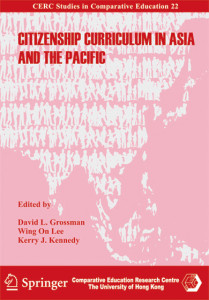Return to CERC Studies in Comparative Education.

Edited by David L. Grossman, Wing On Lee and Kerry J. Kennedy
February 2008
ISBN 978-962-8093-69-4
HK$200 (local), US$32 (overseas)
Published by Comparative Education Research Centre (CERC) and Springer
Order from CERC, Springer, or online.
Preview on Springer or Google Books
Based on case studies of 11 societies in the world’s most dynamic region, this book signals a new direction of study at the intersection of citizenship education and the curriculum. Following their successful volume, Citizenship Education in Asia and the Pacific: Concepts and Issues (published as No. 14 in this series), the editors, widely regarded as leaders in the field in the Asia-Pacific region, have gone beyond broad citizenship education frameworks to examine the realities, tensions and pressures that influence the formation of the citizenship curriculum. Chapter authors from different societies have addressed two fundamental questions: (1) how is citizenship education featured in the current curriculum reform agenda in terms of both policy contexts and values; and (2) to what extent do the reforms in citizenship education reflect current debates within the society? From comparative analysis of these 11 case studies the editors have found a complex picture of curriculum reform that indicates deep tensions between global and local agendas. On one hand, there is substantial evidence of an increasingly common policy rhetoric in the debates about citizenship education. On the other, it is evident that this discourse does not necessarily extend to citizenship curriculum, which in most places continues to be constructed according to distinctive social, political and cultural contexts. Whether the focus is on Islamic values in Pakistan, an emerging discourse about Chinese “democracy” a nostalgic conservatism in Australia, or a continuing nation-building project in Malaysia – the cases show that distinctive social values and ideologies construct national citizenship curricula in Asian contexts even in this increasingly globalized era.
This impressive collection of case studies of a diverse group of societies informs and enriches understanding of the complex relationship between citizenship education and the curriculum both regionally and globally.
David L. Grossman is an Adjunct Senior Fellow of the Education Programme of the East-West Center in Honolulu, Hawaii. Dr. Grossman was formerly Professor and Dean of the Faculty of Languages, Arts and Sciences, and co-Head of the Centre of Citizenship Education at the Hong Kong Institute of Education (HKIEd). Before that he was Director of the Stanford University Programme on International and Cross-Cultural Education (SPICE).
Wing On Lee is Acting President and Vice-President (Academic) of the Hong Kong Institute of Education. Before that he was Professor of Education and Director (International) for Humanities and Social Sciences at the University of Sydney in Australia, where he remains an Honorary Professor. Prior to his Australian appointment, he served at HKIEd as the founding Dean of the School of Foundations in Education, Head of two Departments, and co-Head of the Centre for Citizenship Education.
Kerry J. Kennedy is Acting Vice-President (Academic) and Professor and Dean of the Faculty of Professional and Early Childhood Education at the Hong Kong Institute of Education. He has also served as Head of the Department of Curriculum and Instruction at HKIEd. Prior to that, he was Pro Vice-Chancellor (Academic) at the University of Canberra in Australia.
Read the review in Asia Pacific Journal of Education, Vol.30, No.1, pp.123-126












